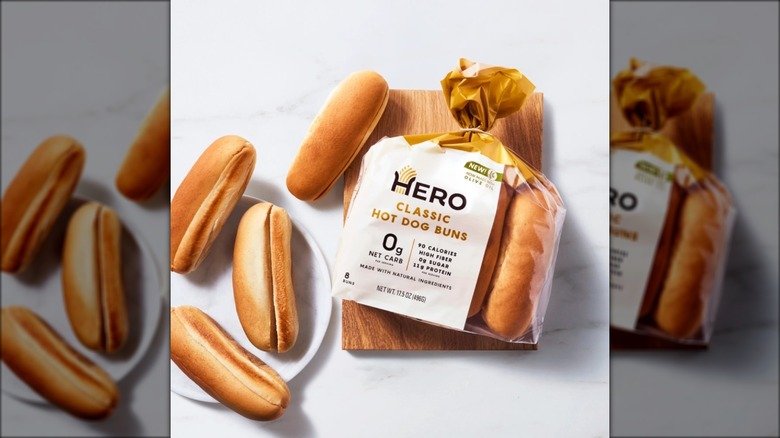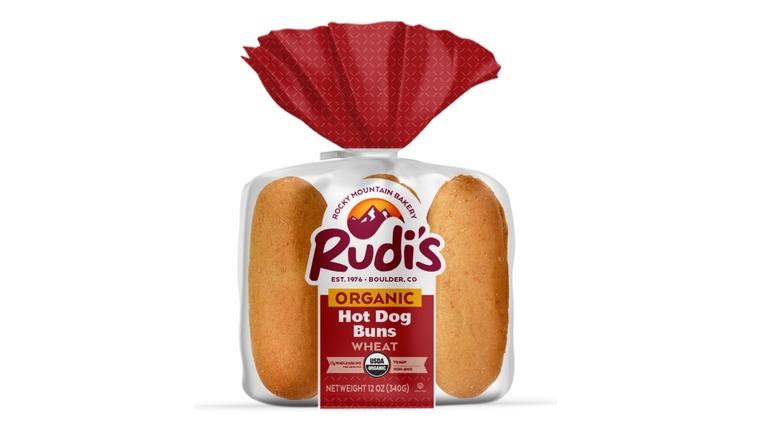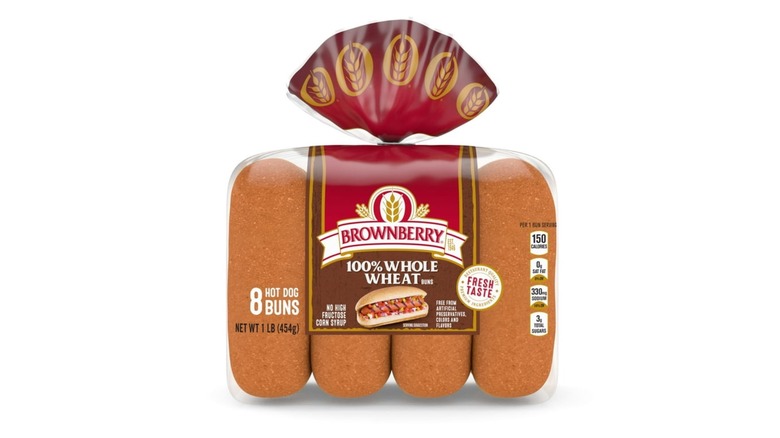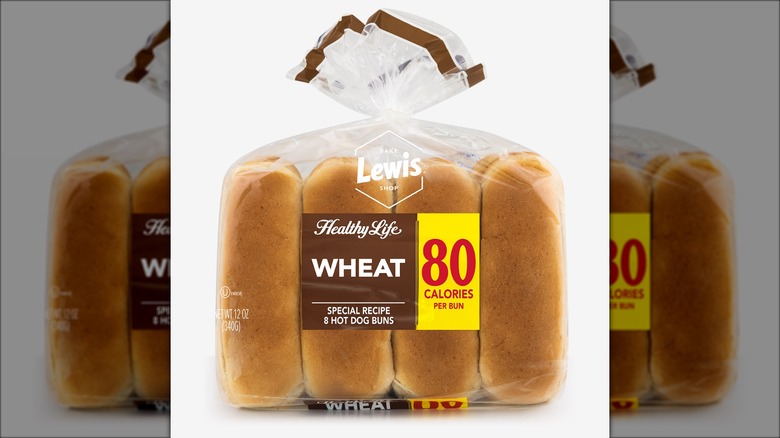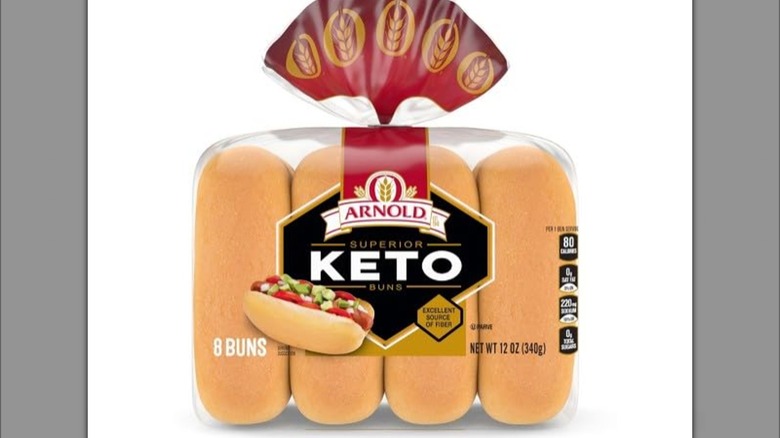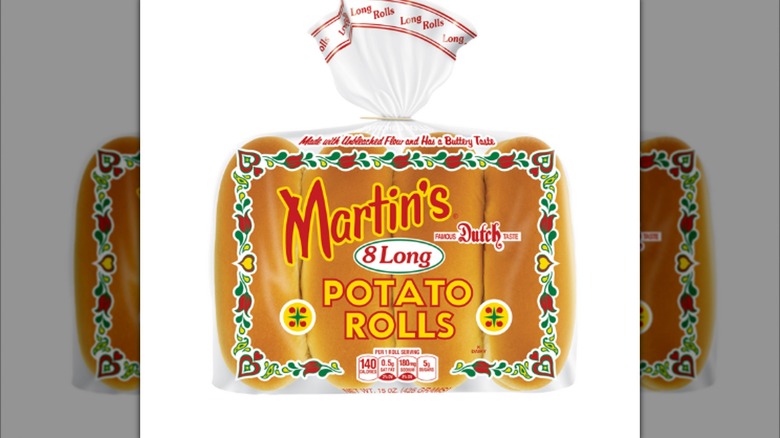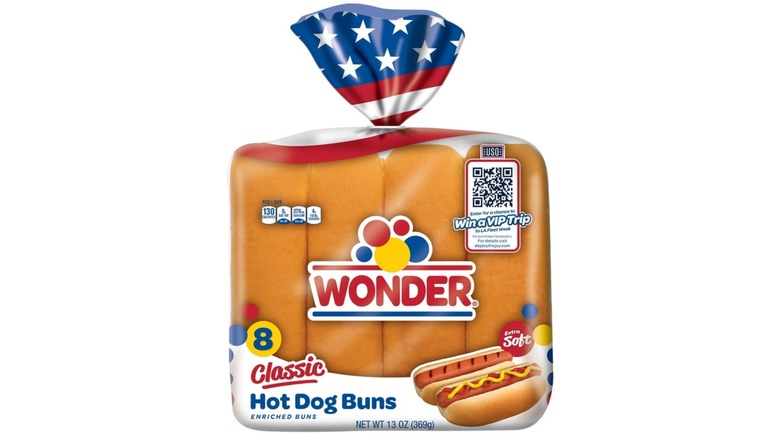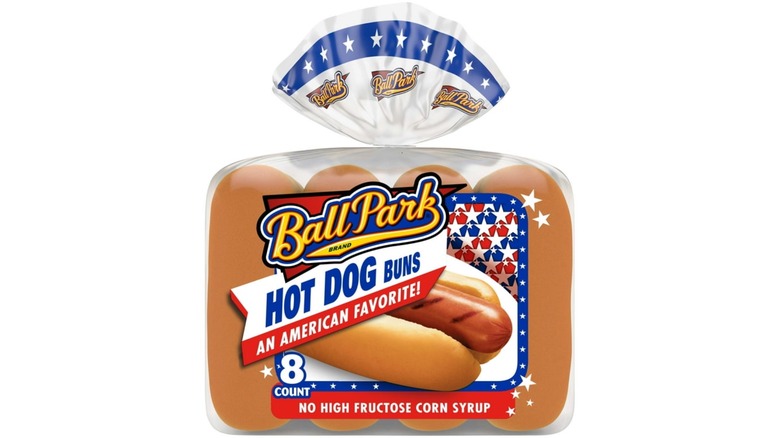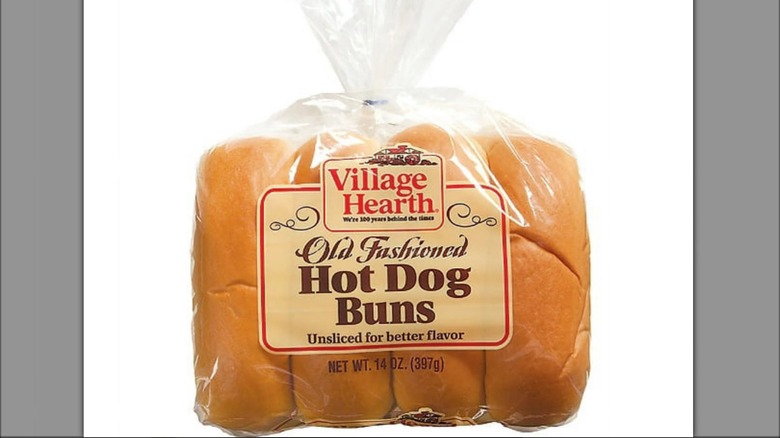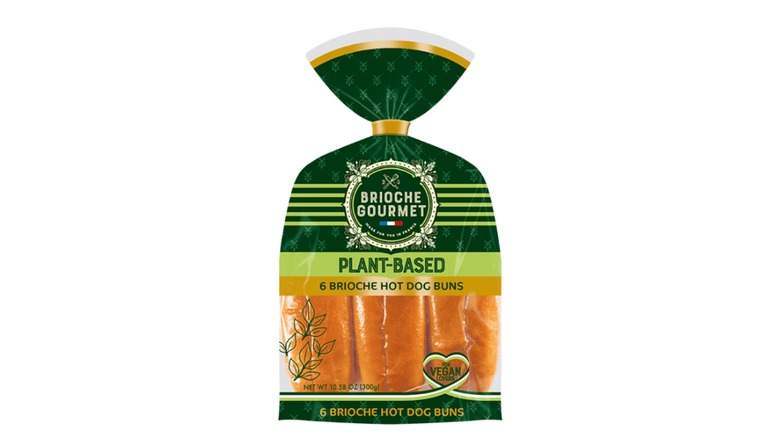5 Healthiest Hot Dogs Buns - And 5 You Should Think Twice About
It's everyone's favorite summer cookout staple or ninth-inning treat: the classic hot dog. But while the meaty hot dog itself might claim all the attention, one should never underestimate the importance of the bun that surrounds it all. Nothing can complete that satisfying, savory bite quite like a soft, pillowy, great-tasting bread — followed up with some ketchup, mustard, or relish, of course.
Hot dog buns come in a variety of shapes, sizes, and brands, filling the bread aisle with seemingly endless possibilities for your upcoming family barbecue. However, not all of them are created equally — especially where nutrition is concerned. Many versions are filled with empty calories, artificial ingredients, preservatives, and other less attractive nutritional qualities that serve to put an unhealthy damper on your favorite grilled treat.
But never fear: we dug into the nutritional information of different popular hot dog buns to determine which to opt for if you're wanting to place your summer entree within a healthier bread. Here are five of the healthiest hot dog buns ... as well as five other varieties you may want to think twice about buying.
Healthy: Hero Classic Hot Dog Buns
Hero Bread is a company made up of bread-lovers who are dedicated in their mission to elimnate empty calories (that is, calories that have limited or zero nutritional benefit) in popular bread products. Its various takes on rolls, tortillas, loaves, croissants, and buns are up for grabs on both its official website, as well as in grocery store aisles across the United States. All of its mouth watering creations embrace more wholesome ingredients while leaving behind the negative ones so often found in bread ... and this includes the company's hot dog buns.
Hero's Classic Hot Dog Buns in particular feature no refined flours, and are instead made from wheat flour, flax seed, fava bean protein, high-quality olive oil, and other nutrient-rich ingredients. Calorically speaking, each bun comes with just 90 calories — all while managing to squeeze in 11 grams of protein and a whopping 22 grams of fiber. Hero's buns are completely plant-based, too, and contain 0 net carbohydrates or sugar. With stats like these, Hero stands ready to help take a typical unhealthy hot dog dinner into the realm of full-blown nutritious. We'd say we're sold.
Healthy: Rudi's Organic Wheat Hot Dog Buns
Eating organically-raised produce, grains, meat, and other foods has become increasingly popular among consumers in recent years — and with good reason. Organic ingredients are generally grown and harvested without the use of synthetic pesticides, fertilizers, antibiotics, growth hormones, or genetic engineering. Studies suggest organic crops and other products contain higher levels of antioxidants, more healthy omega-3 fatty acids, and far less toxic metal exposure, though research is still ongoing (via Healthline). It's easy to see why so many consumers are opting for organic foods wherever they can ... but you probably never expected you could find an organic hot dog bun.
You can, however, in Rocky Mountain Bakery's Rudi's Organic Wheat Hot Dog Buns, which are certified USDA Organic thanks to their array of ingredients. From the organic whole wheat flour to the organic sunflower oil to the organic wheat bran and more, these mix to form deliciously soft, cloud-like buns. Rudi's offers eaters a way to dine more cleanly at their next hot dog-centered barbecue feast. Additionally, each bun brings with it 18 grams of whole grains, 3 grams of fiber, and 4 grams of protein. That's nothing to shake a stick (or should we say, a hot dog) at.
Healthy: Brownberry 100% Whole Wheat Hot Dog Buns
Brownberry is a bread company headquartered in Wisconsin that promises no high fructose corn syrup, preservatives, bleached flours, or other potentially questionable additives in its extensive array of products. This promise extends from its sliced loaves all the way to (you guessed it) its signature whole wheat hot dog buns. If a slightly healthier hot dog is your aim at your next cookout, these buns can certainly aid in making it a reality.
Brownberry's 100% Whole Wheat Hot Dog Buns have a short and simple ingredients list, including whole wheat flour, water, sugar, and yeast. While the product could be considered slightly higher in calories compared to other hot dog bun variants (around 150 each), it also brings more protein and fiber to the table than most — approximately 6 grams of protein and 4 grams of fiber per roll, to be exact. Since both protein and fiber are considered to be filling nutrients, you're more likely be satisfied after a single hot dog housed in a Brownberry bun. Stopping at one could very likely make up for that higher calorie count and then some, so all in all, we'd say this brand is worth a try.
Healthy: Lewis Healthy Life Wheat
For many, losing weight often comes down to simple math: you've just got to take in fewer calories. When weight loss is your primary goal, getting a good understanding of those calories can become extremely important — and oftentimes, people move to cut the bread out of their diet first when trying to consume less of them. However, with this next brand on our list, it's possible that there's no need to forego your beloved bun when you want to enjoy a delicious high-quality hot dog.
If you're looking specifically for a lower-calorie bun option, look no further than Lewis' Healthy Life Wheat Hot Dog Buns. Each one comes in at just 80 calories — around 28% lower than the average hot dog bun, at least as far as the company claims on its website — and includes zero trans or saturated fats. There is both fiber and protein in the recipe, as well, important nutrients which aid in helping one feel full.
For the final pro, there are no artificial flavors, colors, cholesterol, or high fructose corn syrup to be found in these whole-wheat creations. If you're counting calories, we'd say make an effort to save 80 of them for one of these buns at your next grill-out.
Healthy: Arnold Keto Hot Dog Buns
The keto diet, known in full as the ketogenic diet, is an eating guideline which emphasizes taking in as few carbohydrates as possible as part of one's calories, while focusing more on fat and protein. While the standard hot dog — which typically has both fats and proteins present — may very well fall into the keto-friendly zone, the standard carb-filled bun wrapped around it likely will not. But we have some good news for the keto consumers out there: there's no reason to miss out on the bread part of the hot dog dish with this next bun take.
That's because Arnold's Keto Hot Dog Buns are made up mainly of sunflower flour, as opposed to your typical wheat flour, making the carb count substantially lower than that of your standard bun variant. In addition to just 6 grams of total net carbs, the Arnold buns bring to the table just 80 calories a pop, an impressive 9 grams of protein, and 2.5 grams of fat.
While fat can sometimes get a bad rep, it's an essential and necessary macronutrient for your body. If you're strictly following the keto diet, getting adequate fats becomes especially important. Either way, these low-carb buns can certainly make for a healthy way to dress your dog, whether you're strictly adhering to the keto diet or not.
Skip: Martin's Long Potato Rolls
It's an ingredient you'll see listed on the label of many processed bread products: unbleached enriched wheat flour. Though it may not sound too problematic at first glance (isn't wheat good for you, after all?), the truth is that unbleached enriched wheat flour is not the same as whole wheat. Unbleached enriched wheat flour is highly processed,and has many of its nutrients leached out during the refining process.
Since this ingredient is associated with negative health effects — especially when consumed in large amounts — it may be something you want to avoid in your hot dog buns if you're planning to chow down during the weekend barbecue. If that's the case, steer clear of Martin's Long Potato Rolls in the bread aisle. Unbleached enriched wheat flour is at the base of these higher-carb and higher-sugar hot dog buns, along with a long list of preservatives and fillers. On the plus side, however, there are no trans fats or fake dyes in the recipe, and there are around 5 grams of protein to be found in each 140-calorie bun. Is this latter information enough to forgive the former? That's up to you, we suppose.
Skip: Wonder Bread Classic Hot Dog Buns
Wonder Bread has become a household name, its familiar dotted logo spotted throughout the bread aisle of countless grocery stores across the United States. But the next time you're standing there trying to decide between the company's numerous loaf and roll options, you may just want to leave its hot dog buns right where they sit on the shelf.
While each of Wonder Bread's Classic Hot Dog Buns brings with it a relatively modest 130 calories, they are, unfortunately, rather empty ones. Wonder's bun variation is made using a long list of refined ingredients, such as unbleached enriched flour, soybean oil, and soy lecithin. In addition, the sodium level on these particular buns are rather high compared to other versions, at 270 milligrams a pop. This is also true of the carbohydrates, which sit around 25 grams per bun. Given the combination of unimpressive ingredients and the rather subpar nutritional label, we can't say we recommend these ones to house your ultimate healthy hot dog.
Skip: Ball Park White Hot Dog Buns
Ball Park is a brand specializing in buns specifically, and its simple product list includes either hamburger or hot dog buns. Currently, that's it (it also partners with the famous Ball Park franks brand). Given the specificity of the company's focus, one might expect Ball Park's hot dog buns to be a step above the rest. While some might argue this to be the case in the way of taste, unfortunately, it doesn't appear to ring true from a nutritional standpoint.
The Ball Park White Hot Dog Buns, which can be found relatively easily at most local grocers, contain a long and complicated list of refined, added ingredients. It's difficult to locate a single fresh, nutritious element on the label at all, with enriched wheat flour, vegetable oils, preservatives such as calcium propionate and sorbic acid, and thickeners like cellulose gum at the heart of the recipe. Sadly, this means that any calories you obtain from eating this Ball Park product will be relatively empty and void of serious nutritional benefit. Not exactly an attractive notion for the finishing touch on your hot dog, we'd say.
Skip: Village Hearth Old Fashioned Hot Dog Buns
High fructose corn syrup is widely considered to be an unhealthy artificial ingredient for a number of reasons. It's associated with obesity, triggers feelings of hunger, has a direct connection to messing with your blood sugar, and promotes inflammation in your body (via Cleveland Clinic). Greater, more wide-spread knowledge surrounding the potential issues of this high-sugar ingredient has led many food companies to say goodbye to it for good, removing high fructose corn syrup from products and shutting the door behind it. Unfortunately for this next popular hot dog bun on our list, that door remains wide open.
Village Hearth's Old Fashioned Hot Dog Buns may appear soft, pillowy, and innocuous, but they are loaded with high fructose corn syrup. While it is generally recommended for all people to avoid this ingredient as often as possible, it becomes even more important for those who are already managing or at risk for health issues like diabetes and obesity. Since in many cases, hot dogs are served to large crowds of family and friends, it stands to reason that someone in your group could be extra-sensitive to all that high fructose corn syrup. You may want to take a look at your attendees and determine whether or not serving up this ingredient on a platter is the best choice for all.
Skip: Brioche Gourmet Plant-Based Hot Dog Buns
The term "plant-based" tends to bring with it a picture of health, but the truth is that not every single processed plant-based item is immediately good for you. In fact, some recent studies suggest that plant-based foods that are highly processed may increase your risk for cardiovascular diseases, including a 2024 paper published in The Lancet Regional Health – Europe. So, taking the time to read the labels on the backs of grocery store items labeled as "plant-based" is just as important as doing so for any other pre-packaged item.
In the case of this next plant-based hot dog bun on our list, the label should definitely be considered prior to consumption. Brioche Gourmet's Plant-Based Hot Dog Buns may be free of any GMOs or preservatives, but they are quite high in sugar compared to most hot dog buns; 5 grams per serving, to be exact. To make matters worse, all of them are added, highly-processed sugars that are derived from both glucose syrup and invert sugar syrup, according to the label. There are also 210 milligrams of sodium and 26 grams of carbs per bun to account for, as well.
Given these elements, we just aren't convinced about adding a juicy hot dog to this one. But hey, the best thing about America's favorite cookout classic is that it's highly individualized. You get to make it perfect for you, however you see fit ... and this includes your choice of bun.
Methodology
To develop our list of healthy and less-than-healthy hot dog buns, we examined nutritional information gathered from various bread company's websites, as well as ingredient labels featured on the products in question. This included a careful look a ingredients, total calories, carbohydrate and sugar levels, a well as any additional relevant nutritional information for each product. We then rated buns using current dietary research and recommendations published by various reputable health organizations, such as the Mayo Clinic, Healthline, and Cleveland Clinic.
It's important to note that health needs can vary greatly among individual consumers, so what is healthy for one person may not be healthy for another. Individual opinions, experiences, and dietary requirements may vary.

